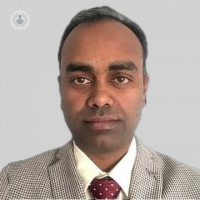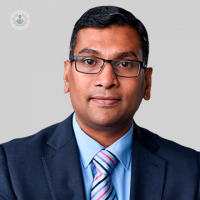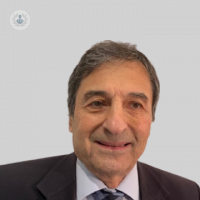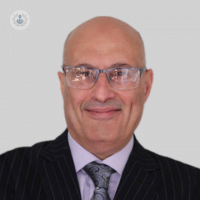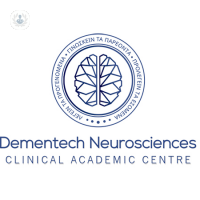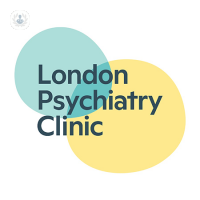What is neuropsychiatry?
Neuropsychiatry, a branch of psychiatry, is the study and treatment of psychiatric or behavioural disorders that occur in patients with neurological conditions. Neuropsychiatrists perform neurological investigations, psychometric studies (neuropsychology) and additional investigations to evaluate disorders such as Parkinson’s, dementia, schizophrenia, cerebrovascular accidents or head injuries.
In turn, neuropsychology complements investigations carried out in the field of neurology and psychiatry with the study of relationships between behaviour and brain functions in patients who have suffered some type of brain damage. In this way, advances can be applied to the diagnosis, treatment and rehabilitation of patients with deficits and damage in brain mechanisms linked to specific behaviours.

Which diseases does neuropsychiatry treat?
Neuropsychiatry is focused on mental disorders in patients with damage to the nervous system. This includes neurological diseases such as Alzheimer’s, Parkinson’s and cerebral palsy. It also includes mental disorders that develop following brain injuries.
What are the subspecialties within neuropsychiatry?
The evaluation and interpretation of the brain and its illnesses is very complicated, which is why specialists must combine psychiatry and neurology, but also needs the input of psychologists and radiologists.
When would I have to visit the neuropsychiatrist?
You would visit a neuropsychiatrist if you have been diagnosed with a disease of the nervous system. The purpose of the visit could be to monitor your disease, to monitor the effectiveness and side effects of medication, or simply to perform cognitive boosting activities or therapy. Some sessions may involve your relatives or other people.
11-13-2012 05-20-2015Neuropsychiatry
Dr Mohan Rathnaiah - Psychiatry
Created on: 11-13-2012
Updated on: 05-20-2015
Edited by: Karolyn Judge
What is neuropsychiatry?
Neuropsychiatry, a branch of psychiatry, is the study and treatment of psychiatric or behavioural disorders that occur in patients with neurological conditions. Neuropsychiatrists perform neurological investigations, psychometric studies (neuropsychology) and additional investigations to evaluate disorders such as Parkinson’s, dementia, schizophrenia, cerebrovascular accidents or head injuries.
In turn, neuropsychology complements investigations carried out in the field of neurology and psychiatry with the study of relationships between behaviour and brain functions in patients who have suffered some type of brain damage. In this way, advances can be applied to the diagnosis, treatment and rehabilitation of patients with deficits and damage in brain mechanisms linked to specific behaviours.

Which diseases does neuropsychiatry treat?
Neuropsychiatry is focused on mental disorders in patients with damage to the nervous system. This includes neurological diseases such as Alzheimer’s, Parkinson’s and cerebral palsy. It also includes mental disorders that develop following brain injuries.
What are the subspecialties within neuropsychiatry?
The evaluation and interpretation of the brain and its illnesses is very complicated, which is why specialists must combine psychiatry and neurology, but also needs the input of psychologists and radiologists.
When would I have to visit the neuropsychiatrist?
You would visit a neuropsychiatrist if you have been diagnosed with a disease of the nervous system. The purpose of the visit could be to monitor your disease, to monitor the effectiveness and side effects of medication, or simply to perform cognitive boosting activities or therapy. Some sessions may involve your relatives or other people.
Experts in Neuropsychiatry
-
Dr Julius Bourke
PsychiatryExpert in:
- Chronic fatigue
- Neuropsychiatry
- Anxiety
- Chronic pain
- Stress
- Depression
-
Dr Pramod Prabhakaran
PsychiatryExpert in:
- Dementia
- Mood disorders
- Anxiety
- Neuropsychiatry
- Adult ADHD
- Medicolegal
-
Dr Srinivas Lanka
PsychiatryExpert in:
- Neuropsychiatry
- ADHD
- Burnout
- Dementia
- Depression
- Expert witness
-
Dr Saad Al-Khalaf
PsychiatryExpert in:
- Neuropsychiatry
- Psychosis
- Dementia
- Bipolar disorder
- Depression
- Anxiety
-
Dr Samr Dawood
PsychiatryExpert in:
- Bipolar disorder
- Sexual dysfunction
- Depression
- ADHD
- Neuropsychiatry
- Psychosis
- See all

77 Wimpole Street
77 Wimpole Street
77 Wimpole Street, London. W1G 9RU
No existe teléfono en el centro.
By using the telephone number provided by TOP DOCTORS, you automatically agree to let us use your phone number for statistical and commercial purposes. For further information, read our Privacy Policy
Top Doctors

Dementech Neurosciences
Dementech Neurosciences
Lister House, 11-12 Wimpole St, London, W1G 9ST
No existe teléfono en el centro.
By using the telephone number provided by TOP DOCTORS, you automatically agree to let us use your phone number for statistical and commercial purposes. For further information, read our Privacy Policy
Top Doctors

London Psychiatry Clinic
London Psychiatry Clinic
55 Harley Street London W1G 8QR
No existe teléfono en el centro.
By using the telephone number provided by TOP DOCTORS, you automatically agree to let us use your phone number for statistical and commercial purposes. For further information, read our Privacy Policy
Top Doctors
-
77 Wimpole Street
77 Wimpole Street, London. W1G 9RU, W1G Marylebone LondonExpert in:
- Homecare
- Cardiology
- Preventive cardiology
- Cardiovascular disease
- Respiratory diseases
- Hypertension
-
Dementech Neurosciences
Lister House, 11-12 Wimpole St, London, W1G 9ST, W1G Marylebone LondonExpert in:
- Neurology
- Psychology
- Psychiatry
-
London Psychiatry Clinic
55 Harley Street London W1G 8QR, W1G Marylebone LondonExpert in:
- Anxiety
- Autism
- Depression
- ADHD
- Obsessive compulsive disorder (OCD)
- Trauma
- Most viewed diseases, medical tests, and treatments
- School refusal
- Maternal mental health
- Seizures
- Parkinson's disease
- Expert witness
- Anxiety
- Medical cannabis prescription
- Stress
- ADHD
- Neurodivergence
